Tired of Top 10 Lists Yet?
John Sutherland’s Top 10 Books About Books on The Guardian.
At the NewPages Blog readers and writers can catch up with their favorite literary and alternative magazines, independent and university presses, creative writing programs, and writing and literary events. Find new books, new issue announcements, contest winners, and so much more!
John Sutherland’s Top 10 Books About Books on The Guardian.
Jacket Copy list of literary films for your holiday down time: “adaptations from novels, short stories, a comic series, biopics, one documentary and fictional renderings of the writing life. And when we got started, it turned out there were just too many, so we imposed rules: no miniseries or film trilogies — so no Lord of the Rings (sorry). Most important, we picked only one movie per year…going back to 1982.”
The University of South Dakota invites applications for a Visiting Creative Writer for the 2011- 12 academic year. Teaching experience and book publication are required, as is an MFA in Creative Writing or a PhD in English (or equivalent). Additional publications, readings, and presentations are desirable. Appointment runs August 22, 2011 to May 21, 2012. Screening begins January 31.
Ther Narrative Fall Story Contest Winners and Finalists have been announced:
FIRST PRIZE
Heather Brittain Bergstrom, “Reading Henry James in the Suburbs”
SECOND PRIZE
Alexander Maksik, “The Barbarians”
THIRD PRIZE
Russell Working, “The Vanishing”
FINALISTS
Greg Brown
Julie Dearborn
Rachel Ewing
Abby Frucht
Ann Harleman
Marc Kaufman
Jerry D. Mathes II
Marsha Rabe
Greta Schuler
Lauren Taylor
The Winter 2011 Story Contest, with a $3,250 First Prize, a $1,500 Second Prize, a $750 Third Prize, and ten finalists receiving $100 each. Open to fiction and nonfiction. All entries will be considered for publication. Contest deadline: March 31, 2011.
Minnesota educators struggle to find books, especially fiction, depicting Muslim young people in America: “It is extremely important for young people to read stories reflecting their ethnicity and/or religion in order to feel like worthwhile human beings,” said Freda Shamma, director of curriculum development for the Foundation for the Advancement and Development of Education and Learning, based in Cincinnati. “The absence of such stories leads to poor grades in school, feelings of loneliness and alienation, and low self-esteem,” said Shamma, who is working on an anthology of Muslim literature directed at middle-school-age students.
Read more on The Star Tribune: Missing character in kids’ literature: Muslims by Norman Draper.
“Literature is supplementary, not antithetical, to history: it allows, and in the best instances demands readers to universalize, empathize, to visualize and imagine, not merely to be informed…Literature, though, affects us in ways that even the most brutal history cannot. It vivifies and propels an event, however geographically and temporally and psychologically removed, towards the personal and immediate. If history teaches and (harshly) informs, then literature rouses and intimately disturbs. Literature is an emotional chronicle, a history of the intangible, a quest to impart sentiment, not information. Conveyance of the Holocaust is an impossible but necessary appeal to our imagination; and literature is the pathos to history’s logos. Not merely learning about, but identifying with.” Read the rest on The Atlantic: The Holocaust’s Uneasy Relationship With Literature by Menachem Kaiser, Fulbright Fellow in Lithuania.
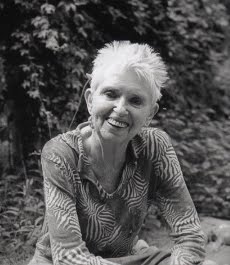 Janine Pommy Vega author of eighteen books and chapbooks since 1968, including The Green Piano (2005), her first CD, Across the Table, recorded in Woodstock, and from live performances in Italy and Bosnia (2007), and an Italian translation of her travel book Tracking the Serpent (Sulle tracce del serpente, Nutrimenti, Rome – 20007) died peacefully at home on December 23, 2010.
Janine Pommy Vega author of eighteen books and chapbooks since 1968, including The Green Piano (2005), her first CD, Across the Table, recorded in Woodstock, and from live performances in Italy and Bosnia (2007), and an Italian translation of her travel book Tracking the Serpent (Sulle tracce del serpente, Nutrimenti, Rome – 20007) died peacefully at home on December 23, 2010.
Vega performed with music and solo, in English and Spanish, in international poetry festivals, museums, prisons, universities, cafes, nightclubs, and migrant workers’ camps in South America, North America and Europe. She was the Director of Incisions/Arts, an organization of writers working with people behind bars; she taught inside prisons for more than twenty-five years, and taught a course in poetics for Bard Prison Initiative. She worked as well in creative writing programs in public schools, elementary through high school-all grades for over twenty years.
Information from Janine Pommy Vega’s official website. Photo by John Sarsgard, 2009.
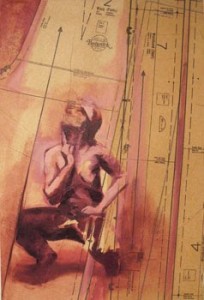 Amanda N. Simons grew up in a small town north of Flint, Michigan and is now an artist and educator in Michigan. I happened to view her art at a poetry reading at Court Street Gallery in Saginaw, and immediately fell in love with her collage style, including the use of sewing patterns in her artwork.
Amanda N. Simons grew up in a small town north of Flint, Michigan and is now an artist and educator in Michigan. I happened to view her art at a poetry reading at Court Street Gallery in Saginaw, and immediately fell in love with her collage style, including the use of sewing patterns in her artwork.
Patti Updikem, the Webb Street School (NY) media specialist, is one of 10 librarians nationwide recognized with the 2010 I Love My Librarian Award for her work in adapting literery classics for students with cognitive disabilities.
Other winners include:
Paul “The Library Guy” Clark
Clay County Library System
Fleming Island, FL
Ellen M. Dolan
Shrewsbury Public Library
Shrewsbury, MA
Melissa McCollum
County of Los Angeles Public Library
Lawndale Library
Lawndale, CA
Christine Wagner
Goodman South Madison Branch Library
Madison, WI
Kelly McDaniel
Helen King Middle School
Portland, Maine
Doug Valentine
McKillop Elementary School
Melissa, TX
Laura Blake
Harry Elkins Widener Memorial Library
Harvard University
Cambridge, MA
Jeff Dowdy
Bainbridge College Library
Bainbridge, GA
Stephanie Wittenbach
Texas A&M University-San Antonio
San Antonio, TX
Writer Beware Blogs! offers a post on Some Tips on Evaluating Literary Contests. As a reminder to our readers, NewPages has a list of what we consider to be “quality” contests run by publications and publishers. These are not paid advertisements. Readers using sources from our list who run into any problems or concerns with the contests should contact us immediately and we will work to resolve the issue or remove the listing.
After 15 years of serving the GLBT and progressive communities of Middle Tennessee and the larger Mid-South Region, OutLoud! Bookstore is closing.
Headlines read: NYC subway service ads replace poetry, literature. Bummer. I enjoyed reading those when in NY.
From The Northwestern: The once-lost soundtrack to Dr. Seuss’s first and only live-action film can now be heard in its entirety after a laborious two and one half year restoration project that included the work of a professor from the University of Wisconsin-Oshkosh.
Posted on the Letras Latinas, weblog of the literary program of the Institute for Latino Studies, University of Notre Dame, A Year in Poetry 2010: Poetry collections published by a Latino or Latina poet this year — with author links.
The editors of The Blue Pencil Online —all artists-in-training in the Writing & Publishing Program at Walnut Hill School for the Arts — publish “the freshest, most imaginative examples of literary craft by young writers (12-18 years) around the world.” In addition to poems, stories, and plays, they consider single-sentence experiments on selected topics (“Pencil Shavings”), audio readings of compelling literary works (“Out Loud!”), writers’ discoveries of the elements of good writing (“A Good Read”), and reflections on the revision process (“The Draft Board”). To learn about submitting work, visit the Writers’ Guidelines.
Currently, the editors of The Blue Pencil Online invite young writers to submit poetry, fiction, and playwriting to the annual Elizabeth Bishop Prizes. Offering $45,000 in scholarships, the Prizes honor Pulitzer Prize–winning poet Elizabeth Bishop, who was a student at Walnut Hill from 1927 to 1930. Since 2004, the members of the Writing & Publishing Program, who constitute the panel of judges for the Prizes, have considered “thousands of submissions by young wordsmiths around the globe.” Submissions are accepted online only, and the deadline is February 1 at noon.
Visit the NewPages Young Authors Guide for more publications for writers and readers alike as well as contests specifically for K-12 and early college students.
Glimmer Train has just chosen the winning stories for their October Family Matters competition. This competition is held quarterly and is open to all writers for stories about family. Word count should not exceed 12,000. (All shorter lengths welcome.)
The next Family Matters competition will take place in April. Glimmer Train’s monthly submission calendar may be viewed here.
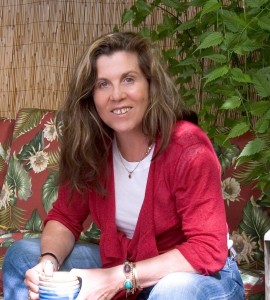 First place: Lee Montgomery [pictured], of Portland, OR, wins $1200 for “Torture Techniques of North Americans.” Her story will be published in the Spring 2012 issue of Glimmer Train Stories.
First place: Lee Montgomery [pictured], of Portland, OR, wins $1200 for “Torture Techniques of North Americans.” Her story will be published in the Spring 2012 issue of Glimmer Train Stories.
Second place: Graham Arnold, of Toronto, Ontario, wins $500 for “A Difference of Nothing.” His story will also be published in an upcoming issue of Glimmer Train Stories, increasing his prize to $700.
Third place: Maggie Shipstead of Atherton, CA, wins $300 for “The Sadness that Radiates from God.”
A PDF of the Top 25 winners can be found here.
Deadline soon approaching: Fiction Open: Jan 2
Glimmer Train hosts this competition quarterly, and first place is $2000 plus publication in the journal. It’s open to all writers, no theme restrictions, and the word count range is 2000-20,000.
Click here for complete guidelines.
The Hudson Valley Writers’ Center has begun a new play writing and play reading series, a venture Executive Assistant Ryan Conatti considers a response to a “lack of outlets for new plays and playwrights.” The series begins with an open contest from which three plays will be selected and read at the Hudson Vally Writers’ Center in June through December 2011. For more information, visit the HVWC website. Deadline for submissions is February 15, 2011.
On Halloween weekend, Alimentum editors Esther Cohen and Paulette Licitra led a group of writers through the hidden gems of New York’s neighborhoods, exploring the ways that food and words inspire each other as part of their series, Eat These Words.
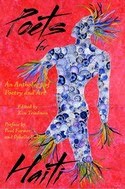 Poets for Haiti is a collection now available from Yileen Press. From the publisher: “Six weeks after the city of Port-au-Prince was brought to its knees by one of the most destructive earthquakes on record – 18 remarkable writers including Robert Pinksy, Rosanna Warren, and Gail Mazur, joined together at Harvard University campus and demonstrated the power of the spoken word. That benefit reading was a vital and galvanizing event, and this anthology has been created to capture some of the magic that was sparked that night. With stunning artwork by some of Haiti’s most prominent visual artists, the volume is itself a work of art. All proceeds from the sale of this anthology will go to Partners in Health to benefit the people of Haiti.”
Poets for Haiti is a collection now available from Yileen Press. From the publisher: “Six weeks after the city of Port-au-Prince was brought to its knees by one of the most destructive earthquakes on record – 18 remarkable writers including Robert Pinksy, Rosanna Warren, and Gail Mazur, joined together at Harvard University campus and demonstrated the power of the spoken word. That benefit reading was a vital and galvanizing event, and this anthology has been created to capture some of the magic that was sparked that night. With stunning artwork by some of Haiti’s most prominent visual artists, the volume is itself a work of art. All proceeds from the sale of this anthology will go to Partners in Health to benefit the people of Haiti.”
Writer JM Tohline has compiled/written a truly exhaustive blog post on The Biggest Mistakes a Writer Makes When Querying Literary Agents in which 50 agents respond to the question: “What is the single biggest mistake writers make when querying you?” Tohline notes that most agents began their response with: “‘Only one? How about several!”
Tohline recommends you brew a pot of coffee before sitting down to read the post: “Yes, reading this will take up a bit of your time (20-30 minutes, to give you a fair projection), but…how important is the success of your novel to you? You’ve (presumably) spent hundreds of hours planning, writing, editing, and perfecting your manuscript. Now, it is time to treat your query with the same respect.”
I think his work is worth a pot of coffee, with the first mug tipped in Tohline’s honor for having taken the time to share this information.
[via Writer Beware Blogs!]
Read Guernica’s interview with Norwegian musician Deeyah, who worked with Freemuse and Grappa Records to create the compilation CD, Listen to the Banned, featuring banned or persecuted artists from around the world. Guernica includes full-song samples of Banned, which features fourteen songs by musicians from China, Pakistan, Iran, Western Sahara/Morocco, Cameroon, The Ivory Coast, Israel/Palestine, Lebanon, Turkey, and Sudan.
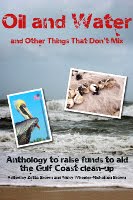 Members of the Southern Writers group She Writes, Zetta Brown and Nicky Wheeler-Nicholson Brown, gathered submissions and created an anthology of stories, poems, and recollections in response to the BP Oil disaster in the Gulf. Oil and Water…and Other Things That Don’t Mix features 27 authors, women and men all dealing with the theme: “Conflict…Resolution Optional.”
Members of the Southern Writers group She Writes, Zetta Brown and Nicky Wheeler-Nicholson Brown, gathered submissions and created an anthology of stories, poems, and recollections in response to the BP Oil disaster in the Gulf. Oil and Water…and Other Things That Don’t Mix features 27 authors, women and men all dealing with the theme: “Conflict…Resolution Optional.”
All proceeds from Oil and Water…and Other Things That Don’t Mix will go to directly benefit MOBILE BAYKEEPER, and BAY AREA FOOD BANK, two charities helping to combat the effects of the spill and help the communities affected.
Authors included in the collection are Jenne’ R. Andrews, Shonell Bacon, Lissa Brown, Mollie Cox Bryan, Maureen E. Doallas, Mylène Dressler, Nicole Easterwood, Angela Elson, Melanie Eversley, Kimeko Farrar, L B Gschwandtner, John Klawitter, Mary Larkin, Linda Lou, Kelly Martineau, Patricia Anne McGoldrick, Ginger McKnight-Chavers, Carl Palmer, Karen Pickell, Dania Rajendra, Cherie Reich, Jarvis Slacks, Tynia Thomassie, Amy Wise, Dallas Woodburn, and contributing editors Zetta Brown and Nicky Wheeler-Nicholson Brown.
Retailers who wish to stock the Oil and Water anthology can contact the publisher directly: editor(at)ll-publications.com
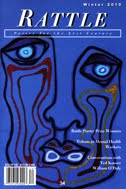 The Winter 2010 (#34) issue of Rattle: Poetry for the 21st Century includes a tribute to mental health workers, “spotlighting the poetry of 26 mental health professionals. These psychiatrists, psychologists, therapists, counselors, and case-workers dive inside the mind daily and come home soggy with the muck of dreams. Many of them write about their careers, but the scope is broad, and all of their poems are informed by years of training and unique insights on the human soul. The section is highlighted throughout by the stunning abstract portraiture of art therapist Mia Barkan Clarke. As psychoanalyst Forrest Hamer writes,’so much depends on what’s under.'”
The Winter 2010 (#34) issue of Rattle: Poetry for the 21st Century includes a tribute to mental health workers, “spotlighting the poetry of 26 mental health professionals. These psychiatrists, psychologists, therapists, counselors, and case-workers dive inside the mind daily and come home soggy with the muck of dreams. Many of them write about their careers, but the scope is broad, and all of their poems are informed by years of training and unique insights on the human soul. The section is highlighted throughout by the stunning abstract portraiture of art therapist Mia Barkan Clarke. As psychoanalyst Forrest Hamer writes,’so much depends on what’s under.'”
The Rattle blog features the poem “Nursing Home” by Ed Galing, which begins:
this morning when i
got up
they had to change
the bed sheets again
because i had wet
myself during the
night
like a baby who can’t
control his bowels,
my helper, miss jones,
a nice young black
girl didn’t mind doing
it,
i just sat in a chair
when she changed the
dirty wet sheets with
new clean ones, and
i said, i am sorry,
and she said, with a smile,
it’s alright,
i used to do it for my
own father when he had
prostate cancer,
in this nursing home
everyone is good to me,
. . .
Four prizes of $1,000 each and publication by the Poetry Society of America are given annually for poetry chapbooks by poets who have not published a full-length collection. Two fellowships are open to poets 30 or younger living in any of the five boroughs of New York City, and two of the fellowships are open to poets of any age living anywhere in the United States. Joy Harjo and Bob Hicok will judge the New York City competition and Susan Howe and Gerald Stern will judge the national competition.
Submit a manuscript of 20 to 30 pages with a $12 entry fee by December 22. Visit the Web site for complete guidelines.
Seven Stories Press is having a holiday sale:
25% off all frontlist titles
50% off all backlist titles
Author catalog list here.
Subject catalog list here.
Enter the coupon code SSPHOLIDAY10 when checking out to claim the backlist discount. Backlist offer limited to titles published before July 1, 2010 and to orders within the US. Buyers are asked to place a separate order for frontlist and backlist titles.
 Humanity: A Celebration of Friendship, Family, Love & Laughter is a collection of photographs compiled by publisher Geoff Blackwell of “images revolving around the universal subject of ‘the fundamental human capacity and need for love'” and that capture “spontaneous human moments of intimacy, laughter, and kinship.” An online photo essay of some of the 17,000 photographers from 164 countries is available at Yes! Magazine.
Humanity: A Celebration of Friendship, Family, Love & Laughter is a collection of photographs compiled by publisher Geoff Blackwell of “images revolving around the universal subject of ‘the fundamental human capacity and need for love'” and that capture “spontaneous human moments of intimacy, laughter, and kinship.” An online photo essay of some of the 17,000 photographers from 164 countries is available at Yes! Magazine.
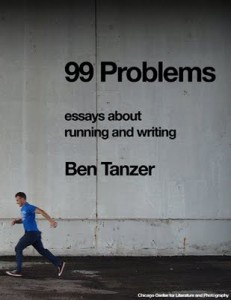 Ben Tanzer’s book 99 Problems: Essays About Running and Writing is available as an e-book, with a twist. On his site, readers who want to download the book have several pay options, or rather amount-to-pay options. “I’d like to pay: $5 – $10 – $20 – a different amount – nothing.” That’s right – “nothing” is an option. Regardless of what amount you pay, or don’t, you’ll get the full-length version of the book. (Kindle users have an Amazon flat rate fee of $5.) The book is also licensed under Creative Commons – a growing culturally conscious way to share works with others. It will be interesting to see how Tanzer’s book does, in terms of readers and payers, and how the new-millennium old question goes, “If you give it to them for free, will they pay for it?” It perhaps even more of interest to writers – even if it’s free, will they read it?
Ben Tanzer’s book 99 Problems: Essays About Running and Writing is available as an e-book, with a twist. On his site, readers who want to download the book have several pay options, or rather amount-to-pay options. “I’d like to pay: $5 – $10 – $20 – a different amount – nothing.” That’s right – “nothing” is an option. Regardless of what amount you pay, or don’t, you’ll get the full-length version of the book. (Kindle users have an Amazon flat rate fee of $5.) The book is also licensed under Creative Commons – a growing culturally conscious way to share works with others. It will be interesting to see how Tanzer’s book does, in terms of readers and payers, and how the new-millennium old question goes, “If you give it to them for free, will they pay for it?” It perhaps even more of interest to writers – even if it’s free, will they read it?
Book Blurb: “Why is it that so many full-time writers seem to be full-time runners as well, and what is it about each activity that seems to fuel the other? In 99 Problems, Chicago author Ben Tanzer tackles this very question, penning a series of essays completed after a string of actual runs across the United States during the winter of 2009, cleverly combining the details of the run itself with what new insights he gained that day regarding whatever literary story he was working on at the time; and along the way, Tanzer also offers up astute observations on fatherhood, middle-age, and the complications of juggling traditional and artistic careers, all of it told through the funny and smart filter of pop-culture that has made this two-time novelist and national performance veteran so well-loved. A unique and fascinating new look at the curious relationship between physical activity and creative intellectualism, 99 Problems will have you looking at the arts in an entirely new way, and maybe even picking up a pair of running shoes yourself.”
Sundance Institute’s Native American and Indigenous Program has created a Fellowship to provide direct support to emerging Native American, Native Hawaiian, and Alaskan Native film artists working in the U.S. The Fellowship is a two-stage development opportunity for filmmakers with feature film scripts, documentary projects, and short film scripts. The first stage of development is an intensive 5-day workshop to be held May 23-27, 2011. During the workshop, Fellows receive intensive feedback on their projects from established screenwriters and directors.
The theme of Talking Writing for December 2010 is Kid Stuff: Writing and Buying Books for Children. Articles include: What Do Teenagers Want? by Rebecca D. Landau; Lessons Learned—Then and Now by Laura Deurmyer; Boys and Books in Lockup: It’s Magic by Lauren Norton Carson; Adoption Books: What’s the Message? by Fran Cronin; One Mom’s Comeuppance by Rebecca Steinitz; Editor’s Note: Kids like what they like—darn them; and Find Your Own Wonderland by Martha Nichols.
Talking Writing is an online monthly literary magazine featuring the work of poets, fiction and creative nonfiction writers, visual artists, and photographers. TW includes long reviews and personal essays.
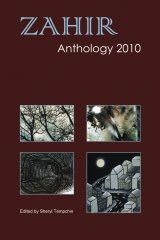 Zahir Anthology 2010 edited by Sheryl Tempchin is now available. From the quarterly online magazine, Zahir: A Journal of Speculative Fiction, this anthology is the complete collection from 2010. “The collection includes twenty-four stories from all over the rich and varied map of speculative fiction. Some are recognizable as sci-fi, fantasy, or magical realism, while others seem to have invented categories all their own. Works of luminous imagination and psychological depth, these are stories that will stay with you long after you’ve closed the book and turned out the light.”
Zahir Anthology 2010 edited by Sheryl Tempchin is now available. From the quarterly online magazine, Zahir: A Journal of Speculative Fiction, this anthology is the complete collection from 2010. “The collection includes twenty-four stories from all over the rich and varied map of speculative fiction. Some are recognizable as sci-fi, fantasy, or magical realism, while others seem to have invented categories all their own. Works of luminous imagination and psychological depth, these are stories that will stay with you long after you’ve closed the book and turned out the light.”
From “Home Ec” by Linda King:
We practiced the art
of radish roses, broccoli florets,
celery stuffed with cheese. Baked soufflés.
Brought it all to the table—oven mitted and apronned
in our own hopsack embroidered creations.
[read the rest: Apple Valley Review]
Pongo’s latest journal entry is “Warm Smiles in Winter,” about a recent poetry workshop with incarcerated women…
Pongo Teen Writing Project has many writing activities and resources on their website for teens, counselors, and teachers.
Some other recent Project Journal posts:
Watching Her and Her (Pongo Prize poetry, about a young woman who witnesses her mother’s struggle with addiction)
The Quieter We Become (about a Pongo volunteer in the psychiatric hospital who describes “holding the unholdable”)
Approaching the Trauma, Not the Crime (about a Pongo volunteer in detention who confronts the legacy of violence in his life)
Love Is a Useless Puppy (Pongo Prize poetry, about a young woman’s love for a boy who treats her badly)
Cops (about police officers who come to understand their own unprocessed trauma after violence and death)
This CFS was previously posted, but the editor is still accepting submissions: Children and War (working title)
When American politicians mention the “hidden costs” of war, they are referring to inflation, higher taxes, and medical care for veterans of U.S. wars. Even when we invoke images of human suffering, children and teenagers are often the forgotten part of the story.
Yet who can forget images of the Vietnam “baby lift,” when Amer-Asian children were flown out of Vietnam to the U.S. to be adopted by American families? Who can forget the horror of learning that Iranian children were being sent on suicide missions to clear landmines? Who wasn’t captivated by stories of the “lost boys” of Sudan, who traveled thousands of miles alone through the desert, seeking shelter and safety?
Children, like adults, lose their homes and families during war. They may travel for miles, alone or with others. They become refugees and victims of rape; they are recruited as soldiers; they suffer from PTSD, starvation, malnutrition, disease, and disability. In a recent report, UNICEF stated that from 1985-1995, over 2 million children had been killed in war; 4-5 million had been left disabled; over 12 million had become homeless; more than 1 million had been orphaned or separated from their parents; and over 10 million suffered psychological trauma. Their experiences affect the next generation as well.
This anthology, to be published by Cinco Puntos Press in 2011 or 2012, will explore all angles of children’s and teenagers’ experiences in war. The core of the book will be personal essays, memoirs, journalistic accounts, and historical narratives, both previously published and original pieces. It may also include photos, artwork, posters, and other debris that depicts the effects of war on children and teens. Though the book will be primarily non-fiction, we may include some fiction, and we are willing to consider pieces about both current and past wars. “War” is defined liberally to include both “official,” declared wars as well as secret, unofficial wars, such as those carried out by governments on civilians in places like Chile, Argentina, and Zimbabwe.
All submissions, queries, and suggestions should be sent to J.L. Powers at [email protected]
All acceptances are conditional. The publisher exercises final editorial control over which pieces will be included.
Katie Umans has won the 2010 St. Lawrence Book Award with her manuscript Flock Book. Katie will receive in $1,000 in prize money and a publication contract from Black Lawrence Press.
The semi-finalists are listed here and the finalists are listed here.
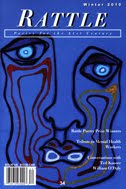 Issue #34 (Winter 2010) of Rattle: Poetry for the 21st Century includes the winner of the Rattle Poetry Prize, Patricia Smith, as well as the honorable mentions: Michele Battiste, Heidi Garnett, Valentina Gnup, francine j. harris, Courtney Kampa, Devon Miller-Duggan, Andrew Nurkin, Laura Read, and Scott Withiam.
Issue #34 (Winter 2010) of Rattle: Poetry for the 21st Century includes the winner of the Rattle Poetry Prize, Patricia Smith, as well as the honorable mentions: Michele Battiste, Heidi Garnett, Valentina Gnup, francine j. harris, Courtney Kampa, Devon Miller-Duggan, Andrew Nurkin, Laura Read, and Scott Withiam.
The Pedestrian is curious. In the best sense. A compilation of essays written by long-dead writers and today’s up-and-comers, The Pedestrian is dedicated to immortalizing what some may view as a dying art, the essay. With the rise of creative nonfiction, the essay has been sorely missing from many modern journals. The existence of this magazine is promising, and, like any good essay, ripe with curiosity, wonder, and philosophy. Continue reading “The Pedestrian – August 2010”
This volume of the Roanoke Review features the work of 8 fiction writers, including the journal’s three fiction prize-winners, 24 poets, and an interview with poet and novelist Lee Upton. Contributors’ notes include the writers’ statements about the genesis of their pieces and/or their writing process. Poetry and fiction are characterized by affable, accessible voices, and moving stories. Continue reading “Roanoke Review – 2010”
Published by Pacific University in Oregon, Silk Road includes fiction, poetry, and nonfiction. As diverse as these three genres are, so is the work presented within each. Continue reading “Silk Road – Spring 2010”
This is a tiny little journal, literally, despite its large ambitions—“this journal is designed as an opportunity to bask in the general shiftiness of translation…serves as a home to foreign poetry, as a tool for developing new work, and as an experiment in translation,” the editors tell us—Telephone fits snugly in one palm. This inaugural issue features the work of Berlin poet Uljana Wolf whose original five poems serve as a “jumping-off point” for more than a dozen poets writing in English, including Mary Jo Bang, Matthea Harvey, Robert Fitterman, Erin Moure, and Craig Santos Perez, among others. Continue reading “Telephone – Fall 2010”
The editor of the first issue of Trachodon, named after a dinosaur that never existed, writes in his editor’s note, “I want TRACHODON the magazine…to be this weird, sort of impossible thing. Something that’s up for debate because it’s always leaning a little toward the unreasonable. And, maybe, to be something that’s never quite finished.” Continue reading “Trachodon – Summer/Fall 2010”
This issue’s theme is “renegades,” perfectly apt for the journal as a publication of “new international poetics.” New poems from the prolific and ever-renegade-ish Tomaz Salumun, translated from the Slovenian by Michael Thomas Taren and the author, serve as a fitting start: “The relation between you can and you cannot / is art, / therefore the line is art.” The “you can” is poetry from two and a half dozen poets, reviews, and provocative visual art from Tanya Cooper and the journal’s marvelous—appropriately curious and disturbing—cover by Mathieu Bories. The “you cannot” is ignore Vallum as a poetic force to be reckoned with. Continue reading “Vallum – 2010”
How is it that there have been 20 issues before the one I’m holding—die cut corner, rubber band binding, and all—in amazement of this charming and worthwhile little journal and I had not heard of it or seen it anywhere? Published by Ugly Duckling Presse, 6×6 features the work of just 6 (of course!) writers (in this issue: Julie Carr, Marosa di Giorgio, Farid Matuk, Amanda Nadelberg, Sara Wintz, and Michael Barron) in an innovative, but low-key design that is original, clever, but unassuming. The poetry is paramount. And it deserves the attention the design enables. Continue reading “6×6 – Fall 2010”
The “Endurance” issue of Annalemma should be abysmally depressing, as all of the stories and essays in it are sad. The great care put into its design, however, gives one answer to the editor’s question of “what gives a person forward momentum when every sign around them says give up.” Editor/publisher Chris Heavener says that “to endure means having a purpose.” His publication shows that one can find purpose though literature and art.
Arcadia is an annual produced by students at the University of Central Oklahoma. The inaugural issue features fiction, poetry, drama, an essay, and several black and white photographs. A brief bio page precedes each writer’s piece. This issue includes work by writers from around the country widely published, for the most part, in a variety of literary journals and by a number of independent presses. Continue reading “Arcadia – 2010”
This issue features a marvelous interview with and series of poems by Ana Minga, a young journalist and poet from Ecuador, whose work is translated here by Alexis Levitin. Having grown up in a religious community where her father worked, Minga says her childhood ended at age six; she suffered dreadful insomnia by age 11; and by her teens she was writing and publishing award-winning poetry. Her best friends, she claims, are her dogs; investigative journalism provides the adrenalin “rush” she needs to thrive. Her work reflects these realities: Continue reading “The Bitter Oleander – Autumn 2010”
“A themed journal of fiction, non-fiction, poetry, photography and miscellany,” this issue is a “Chekhov Bilingual” comprised of an introductory essay by editor Tamara Eidelman; excerpts from “Notebooks” by Ivan Bunin (1870-1953), one of Chekhov’s contemporaries; a poem by Sasha Chyorny (1880-1932) “Why Did Chekhov Quit this Earth So Soon?”; and 8 stories and play excerpts by the great master, some newly translated. It is fantastic, even for those of us who do not read Russian, to have the originals and the translations side by side, and I wish more journals would follow suit and publish the originals as an integral component of presenting non-English work. I was delighted, too, to learn in the publisher’s note, that 1,000 copies of the journal were given to Russian language students at several hundred high schools and universities around the US, thanks to a grant to the magazine from The Ruskkiy Mir Foundation. Continue reading “Chtenia – Fall 2010”
Known for its colloquial writing, The Main Street Rag, in its latest issue, features an interview with Steve Roberts, author of the Main Street Rag poetry book Another Word for Home; six fiction entries (though one is also, perplexingly, labeled as “Commentary”); over 100 pages devoted to poetry, including writers such as Lyn Lyfshin; five book reviews, and a page of feedback from readers. Continue reading “Main Street Rag – Fall 2010”
This issue of the Mississippi Review somehow evokes a European tone, though the journal is firmly rooted in the Deep South. Editor Frederick Barthelme’s selections for the Review’s fiction and poetry prizes are united by the narrative risks taken by the authors. These gambles pay off for the most part, resulting in work that grabs more attention than conventional work while still fulfilling the reader’s craving for the standard story elements, including plot, character and setting. Continue reading “Mississippi Review – Spring 2010”
In the latest issue of the New York Quarterly, we are reminded why it has survived for over 40 years while so many other literary journals of import both large and small are now defunct. The diversity of poetry in this journal makes it extremely inviting as if many disparate voices are having an energetic conversation so stimulating there is no need of a proper segue. Continue reading “The New York Quarterly – 2010”
Those who wish to participate in the latest literary world gossip should read The Paris Review. Articles have been written about its new editor, Lorin Stein, for months. Moreintelligentlife.com reports that the 37 year old former Farrar, Straus and Giroux editor is looking for “the best of the best, period—except I don’t really believe in The Best.” According to New York Magazine, Stein’s publishers told him they were looking for “boldness.” The Financial Times reports that “the magazine’s relationship with reportage has ended.” Poets are lamenting the choice of Stein and new poetry editor Robyn Creswell to reject all of the poems previously accepted and slated for future publication. (Many of the rejected poems can be found at The Equalizer.) Continue reading “The Paris Review – Fall 2010”